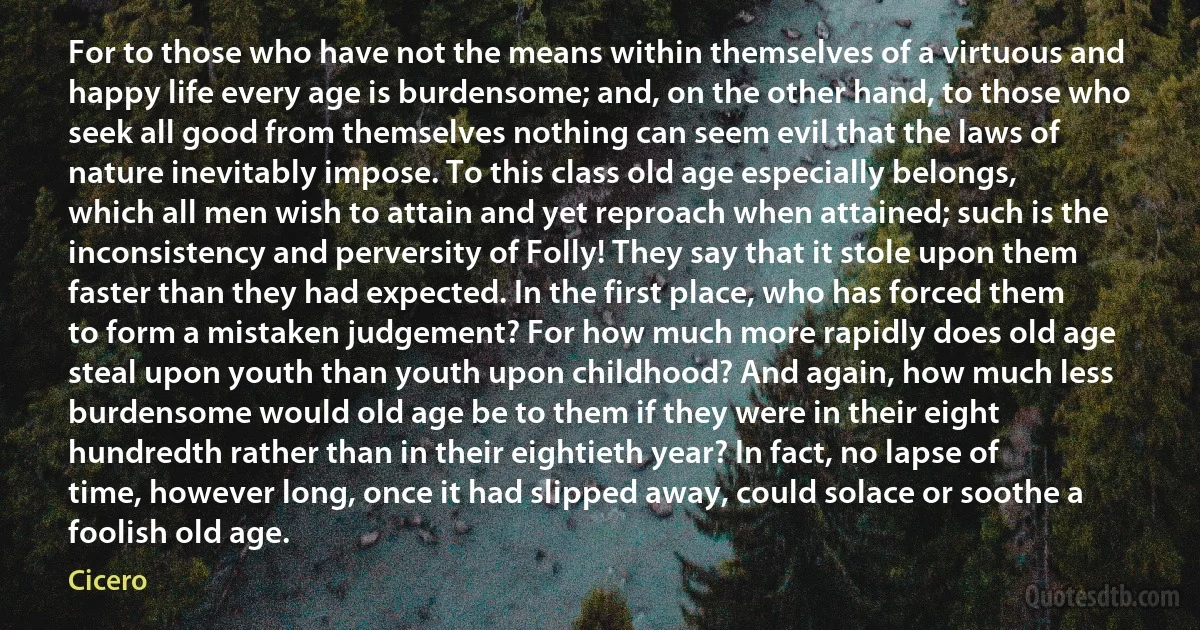
For to those who have not the means within themselves of a virtuous and happy life every age is burdensome; and, on the other hand, to those who seek all good from themselves nothing can seem evil that the laws of nature inevitably impose. To this class old age especially belongs, which all men wish to attain and yet reproach when attained; such is the inconsistency and perversity of Folly! They say that it stole upon them faster than they had expected. In the first place, who has forced them to form a mistaken judgement? For how much more rapidly does old age steal upon youth than youth upon childhood? And again, how much less burdensome would old age be to them if they were in their eight hundredth rather than in their eightieth year? In fact, no lapse of time, however long, once it had slipped away, could solace or soothe a foolish old age.
CiceroRelated topics
age childhood eight evil folly form good happy hundredth impose inconsistency men lapse less life mistake nature nothing once perversity place say seek slip steal stole time wish year yet youth means judgement LawsRelated quotes
This option the consumer retains of being able to buy security wherever he pleases brings about a constant emulation among all the producers, each producer striving to maintain or augment his clientele with the attraction of cheapness or of faster, more complete and better justice.If, on the contrary, the consumer is not free to buy security wherever he pleases, you forthwith see open up a large profession dedicated to arbitrariness and bad management. Justice becomes slow and costly, the police vexatious, individual liberty is no longer respected, the price of security is abusively inflated and inequitably apportioned, according to the power and influence of this or that class of consumers. The protectors engage in bitter struggles to wrest customers from one another. In a word, all the abuses inherent in monopoly or in communism crop up.

Gustave de Molinari
If Christ were to walk in this world today, do you know what would happen to Him? He would be placed in a mental institution and given psycho-therapy, just as would His Saints. The world would crucify Him today just as it did 2000 years ago, for the world has not learned a thing, except more devious forms of hypocrisy. And what would happen if, in one of my classes at the university, I would one day tell my students that all the learning of this world is of no importance beside the duty of worshipping God, accepting the God-man who died for our sins, and preparing for the life of the world to come? They would probably laugh at me, and the university officials, if they found out, would fire me-for it is against the law to preach the Truth in our universities. We say that we live in a Christian society, but we do not: we live in a society.

Seraphim Rose
Were we required to characterise this age of ours by any single epithet, we should be tempted to call it, not an Heroical, Devotional, Philosophical, or Moral Age, but, above all others, the Mechanical Age. It is the Age of Machinery, in every outward and inward sense of that word; the age which, with its whole undivided might, forwards, teaches and practises the great art of adapting means to ends. Nothing is now done directly, or by hand; all is by rule and calculated contrivance. For the simplest operation, some helps and accompaniments, some cunning abbreviating process is in readiness. Our old modes of exertion are all discredited, and thrown aside. On every hand, the living artisan is driven from his workshop, to make room for a speedier, inanimate one. The shuttle drops from the fingers of the weaver, and falls into iron fingers that ply it faster.

Thomas Carlyle
The prejudices of the second species, since they impose upon the intellect by the sensual conditions restricting the mind if it wishes in certain cases to attain to what is intellectual, lurk more deeply. One of them is that which affects knowledge of quantity, the other that affecting knowledge of qualities generally. The former is: every actual multiplicity can be given numerically, and hence, every infinite quantity; the latter, whatever is impossible contradicts itself. In either of them the concept of time, it is true, does not enter into the very notion of the predicate, nor is it attributed as a qualification to the subject. But yet it serves as a means for forming an idea of the predicate, and thus, being a condition, affects the intellectual concept of the subject to the extent that the latter is only attained by its aid.

Immanuel Kant
[ Diogenes] was surprised by the fact that had he claimed to be a physician for the teeth, everybody would flock to him who needed to have a tooth pulled; yes, and by heavens, had he professed to treat the eyes, all who were suffering from sore eyes would present themselves, and similarly, if he had claimed to know of a medicine for diseases of the spleen or for gout or for running of the nose; but when he declared that all who should follow his treatment would be relieved of folly, wickedness, and intemperance, not a man would listen to him or seek to be cured by him, ... as though it were worse for a man to suffer from an enlarged spleen or a decayed tooth than from a soul that is foolish, ignorant, cowardly, rash, pleasure-loving, illiberal, irascible, unkind, and wicked, in fact utterly corrupt.

Dio Chrysostom
